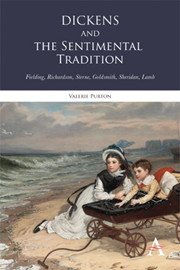Book contents
- Frontmatter
- Contents
- Acknowledgements
- A Note on the Text
- Introduction
- Chapter 1 Dickens and the Sentimentalist Tradition
- Chapter 2 Sentimentalism and its Discontents in the Eighteenth-Century Novel: Fielding, Richardson and Sterne
- Chapter 3 Sentimentalism and its Discontents in Eighteenth-Century Drama: Goldsmith and Sheridan
- Chapter 4 Dickens and Nineteenth-Century Drama
- Chapter 5 The Early Novels and The Vicar of Wakefield
- Chapter 6 The Later Novels
- Conclusion The Afterlife of Sentimentalism
- Notes
- Bibliography
- Index
Chapter 2 - Sentimentalism and its Discontents in the Eighteenth-Century Novel: Fielding, Richardson and Sterne
Published online by Cambridge University Press: 05 November 2012
- Frontmatter
- Contents
- Acknowledgements
- A Note on the Text
- Introduction
- Chapter 1 Dickens and the Sentimentalist Tradition
- Chapter 2 Sentimentalism and its Discontents in the Eighteenth-Century Novel: Fielding, Richardson and Sterne
- Chapter 3 Sentimentalism and its Discontents in Eighteenth-Century Drama: Goldsmith and Sheridan
- Chapter 4 Dickens and Nineteenth-Century Drama
- Chapter 5 The Early Novels and The Vicar of Wakefield
- Chapter 6 The Later Novels
- Conclusion The Afterlife of Sentimentalism
- Notes
- Bibliography
- Index
Summary
‘There was more of pleasantry in the conceit, of seeing how an ass would eat a macaroon – than of benevolence in giving him one.’
My father had left a small collection of books in a little room upstairs, to which I had access (for it adjoined my own) and which nobody else in our house ever troubled. From that blessed little room, Roderick Random, Peregrine Pickle, Humphrey Clinker, Tom Jones, The Vicar of Wakefield, Don Quixote, Gil Blas, and Robinson Crusoe, came out, a glorious host, to keep me company. They kept alive my fancy, and my hope of something beyond that place and time, – they, and the Arabian Nights and the Tales of the Genii, – and did me no harm; for whatever harm was in some of them was not there for me. I knew nothing of it…I have been Tom Jones (a child's Tom Jones, a harmless creature) for a week together. I have sustained my own idea of Roderick Random for a month at a stretch, I verily believe… This was my only and my constant comfort.
Wilhelm Dibelius commented as long ago as 1916 that Dickens was an author who ‘das 19. Jahrhundert mit den Augen des 18. betrachtet’ (saw the nineteenth century with the eyes of the eighteenth). This is the accepted view, that Dickens's childhood reading of Fielding, Sterne and Smollett helped form his moral vision.
- Type
- Chapter
- Information
- Dickens and the Sentimental TraditionFielding, Richardson, Sterne, Goldsmith, Sheridan, Lamb, pp. 19 - 44Publisher: Anthem PressPrint publication year: 2012



